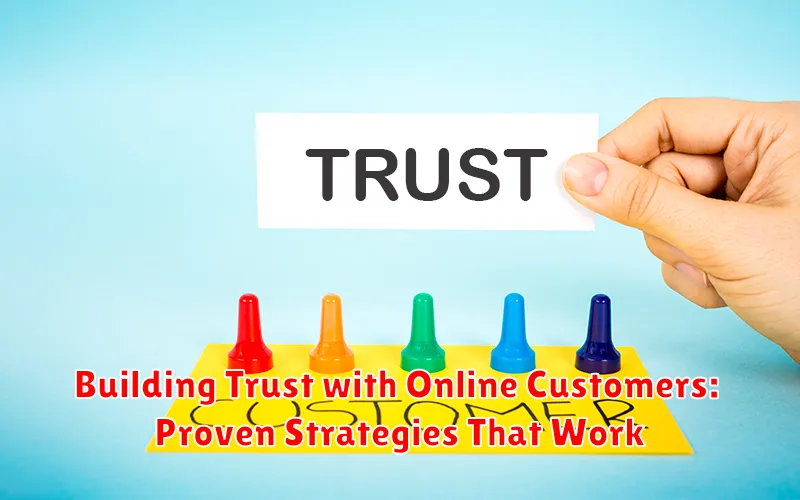In today’s digital age, building trust with online customers is paramount to the success of any business. Online trust translates directly into customer loyalty, positive online reviews, and ultimately, increased sales. This article explores proven strategies that businesses can implement to cultivate trust and foster long-term relationships with their online customers. We’ll delve into the key elements of building a trustworthy online presence, covering aspects such as transparency, security, communication, and customer service.
Gaining the trust of online customers requires a multifaceted approach that goes beyond simply offering a secure checkout process. From showcasing genuine customer testimonials and highlighting security measures to providing exceptional customer service and actively engaging with your audience, numerous proven strategies can significantly impact your ability to build a trustworthy online presence. Learn how to implement these strategies and turn skeptical browsers into loyal online customers who confidently choose your business over the competition.
Understanding the Importance of Trust in E-commerce
In the digital marketplace, trust serves as the bedrock of successful e-commerce. Without it, businesses struggle to convert casual browsers into loyal customers. Trust significantly influences purchasing decisions, directly impacting a company’s bottom line. Customers are more likely to engage with and purchase from brands they perceive as reliable and dependable.
Consider the inherent risks involved in online transactions. Customers share sensitive information, including payment details and personal addresses. A lack of trust can amplify anxieties related to online security, data breaches, and potential scams. Building trust mitigates these concerns, fostering a sense of security and encouraging customers to complete their purchases.
Moreover, trust cultivates long-term customer relationships. When customers trust a brand, they’re more likely to return for future purchases and recommend the business to others. This organic growth through word-of-mouth referrals is invaluable in today’s competitive e-commerce landscape.
Transparency: Building Trust Through Open Communication
Transparency is a cornerstone of building trust with online customers. Openly communicating your business practices, policies, and even challenges fosters a sense of honesty and reliability. Customers are more likely to trust a business that is upfront about its operations.
Clearly displaying pricing, including any additional fees or shipping costs, is crucial. Hidden costs erode trust quickly. Be upfront about your return policy and make it easy to find and understand. This demonstrates confidence in your products and services.
Communicate proactively about any delays or issues. If a shipment is delayed, inform customers immediately and provide updates. Honesty, even when things go wrong, strengthens customer relationships. Explain your data privacy policies in clear, concise language. Customers value businesses that respect and protect their personal information.
Providing Excellent Customer Service: Going the Extra Mile
In the competitive online marketplace, excellent customer service is paramount to building trust and fostering loyalty. Responding promptly and efficiently to customer inquiries, whether through email, chat, or phone, demonstrates a commitment to their needs.
Proactive communication is key. Keeping customers informed about their order status, potential delays, or any other relevant information builds confidence and reduces anxiety. Offering multiple channels for support caters to diverse preferences and ensures accessibility.
Going the extra mile can involve personalized recommendations based on past purchases, exclusive discounts for loyal customers, or even a simple handwritten thank you note. These small gestures can significantly impact customer perception and create a positive brand experience.
Empowering customer service representatives to resolve issues efficiently and effectively is crucial. Providing them with the necessary tools and training ensures they can handle a wide range of situations and deliver exceptional support.
Showcasing Social Proof: Testimonials and Reviews
In the digital age, potential customers often look to the experiences of others before making a purchase. Social proof, such as testimonials and reviews, plays a crucial role in building trust and credibility.
Testimonials offer compelling narratives from satisfied customers. Highlighting specific benefits and positive experiences can significantly influence purchasing decisions. Feature testimonials prominently on your website, perhaps on product pages or a dedicated testimonials section.
Online reviews, both positive and negative, provide valuable insights into the customer experience. Encourage customers to leave reviews after a purchase. Address negative reviews promptly and professionally, demonstrating a commitment to customer satisfaction. A healthy mix of reviews adds authenticity and helps manage expectations.
Consider incorporating platforms like Trustpilot or Yelp to gather and showcase reviews. These platforms offer established credibility and streamline the review process.
Security Measures: Protecting Customer Data and Privacy

In the digital age, security is paramount. Customers entrust businesses with sensitive information, and safeguarding that data is crucial for building and maintaining trust. Robust security measures demonstrate a commitment to protecting customer privacy and fostering a secure online environment.
Implementing SSL encryption is a fundamental step. This technology encrypts data transmitted between the customer’s browser and the website’s server, preventing unauthorized access to sensitive information like credit card details and personal data. Displaying a visible security seal, such as a padlock icon in the browser’s address bar, further reassures customers of the site’s security.
PCI DSS compliance is essential for businesses handling credit card transactions. This set of security standards ensures that businesses are taking the necessary steps to protect cardholder data. Regular security audits and vulnerability assessments are also crucial for identifying and addressing potential weaknesses in the system.
A clear and concise privacy policy is vital. This policy should outline what data is collected, how it is used, and who it is shared with. Transparency about data practices builds confidence and demonstrates respect for customer privacy. Offering customers control over their data, such as opting out of marketing communications, further strengthens this trust.
Authenticity: Being Real and Genuine with Your Audience
In the digital age, where consumers are bombarded with countless marketing messages, authenticity stands out. Customers can quickly spot inauthenticity, which can severely damage your brand’s reputation. Being genuine means letting your true brand personality shine through. Don’t try to be something you’re not. Embrace your strengths and weaknesses, and be transparent with your audience.
Sharing your story is a powerful way to connect with customers on a deeper level. This could involve discussing the challenges you faced when starting your business or highlighting the values that drive your company. People connect with stories, and sharing yours can humanize your brand and build trust.
Using real imagery and language also contributes to authenticity. Avoid overly polished, stock photos that feel impersonal. Instead, opt for genuine images that reflect your brand’s personality. Similarly, use clear and concise language that resonates with your target audience. Avoid jargon or overly promotional language that can feel disingenuous.
Consistency: Delivering on Promises Every Time
In the digital realm, consistency is paramount. Meeting deadlines, maintaining product quality, and providing reliable customer service are crucial for building trust. Inconsistency creates doubt and undermines the customer’s confidence in your brand.
Establish clear service level agreements (SLAs) and adhere to them rigorously. If you promise 24/7 customer support, ensure it’s available. If you guarantee two-day shipping, make sure orders are processed and delivered within that timeframe. Consistent performance builds credibility and reinforces customer loyalty.
This also applies to your brand’s messaging and online presence. Maintain a consistent tone of voice and brand identity across all platforms. Regularly update your website and social media channels with valuable content. A consistent online presence signals professionalism and reliability.
Building a Strong Community: Fostering Connections with Customers
A thriving online community can significantly boost customer trust. When customers feel connected to your brand and each other, they’re more likely to trust your recommendations and remain loyal.
Active engagement is key. Respond to comments and questions promptly. Initiate conversations and polls related to your products or industry. This shows customers you value their input and are invested in their experience.
Create exclusive spaces. Consider establishing a dedicated forum or private social media group. This provides a platform for customers to connect with each other, share experiences, and build relationships, further solidifying their connection with your brand. This fosters a sense of belonging and encourages open communication.
Recognize and reward your community members. Highlighting customer contributions, offering exclusive discounts, or featuring user-generated content can make customers feel valued and appreciated.
Offering Guarantees and Warranties: Mitigating Risk

Guarantees and warranties are powerful tools for building trust by directly addressing customer anxieties related to online purchases. They demonstrate a willingness to stand behind your products or services and mitigate perceived risk for the buyer.
A strong guarantee can reassure customers that their investment is protected. It shows confidence in the quality and reliability of what you offer. Consider offering a satisfaction guarantee, a money-back guarantee, or a no-questions-asked return policy. Clearly define the terms and conditions of the guarantee to manage expectations and avoid misunderstandings.
Warranties, especially for products, offer an additional layer of protection. They assure the customer that the product will function as intended for a specific period. A clear warranty policy can differentiate your business from competitors and build long-term trust. Be sure to specify the coverage, duration, and claim process for your warranties.

